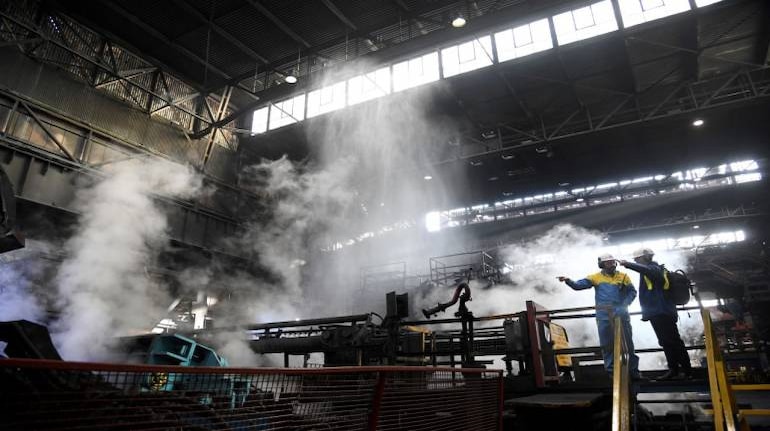



Tata Steel may be forced to look outside Europe for a buyer of its Dutch facilities after Sweden's SSAB pulled away from a possible deal. It's going to be a tough task, say, industry observers, with the Indian company's best bet being in the Russian steelmakers.
SSAB on January 29 announced that it was no longer keen to go forward with the deal to buy Tata Steel's Dutch units. The two sides had initiated the talks in November 2020.
"It is a setback for Tata Steel. They have been looking for a solution for their European business. But now with two failed attempts, their scope for a good solution is narrowing," said a senior executive from the European steel industry.
Before SSAB, it was in talks with Germany's Thyssenkrupp to form a joint venture. The European Commission had blocked the proposed joint venture, saying it will hurt competition in some of the key segments of the steel sector in Europe. The commission had identified three industry segments - automotive steel, coated steel used for packaging, and electrical steel - where the JV may harm competition.
Hopes of a successful talk were higher with SSAB, especially with no possible hurdle at the Commission. But the Swedish company said the acquisition didn't meet SSAB's overall vision for a fossil-free production. Europe has been pushing steelmakers to reduce their carbon footprint.
“The synergies that we saw in the transaction would not fully justify the costs and investments required for our desired transformation. This means that overall, the transaction would not meet our financial expectations,” Martin Lindqvist, President, and CEO at SSAB said. The group’s goal is to be the first in the world to supply fossil-free steel by 2026 and to be a fossil-free company by 2045.
The dual impact
The twin failures pull back Tata Steel on multiple fronts.
"Engaging with a company is a time-taking, and resource-burning exercise," said an industry executive who has held senior-level positions at steel companies in India. "A lot of due diligence takes place, people are involved. And through these times, clients, vendors, and customers are also on tenterhooks as they also wait for an outcome," the executive added.
Tata Steel's talks with Thyssenkrupp had last for over a year before it ended in May 2019. It took another year and a half's search for the Indian company to formally announce its engagement with SSAB. This has now lasted over two months.
Also, the valuation of the Dutch assets will be hit. "The unit continues to be one of Europe's best run and most profitable units. But given the reservations raised by SSAB, this will hamper future talks, " said the first executive quoted above.
Carbon emissions have been a much-discussed subject in Europe, with government efforts to reduce pollution getting popular support. Tata Steel would be forced to spend more to reduce the carbon footprint of its units in the UK and the Netherlands. A sale of the Dutch units will not just save it money, but also provide enough funds to clear off the debts, of 1.7 billion Euros, on the books of Tata Steel Europe.
Industry observers reckoned the company would have netted up to $3 billion from the sale of Dutch units.
Tata Steel has tried to downplay the setback. " Currently, around two-thirds of the business of Tata Steel is based in India with best in class, highly cost-competitive assets, and strong cash flows and Tata Steel remains committed to undertaking significant de-leveraging in FY21 and beyond," the company had said.
But the one-third of the business continues to be a thorn in the flesh, and investors will be concerned. The company's stock had dived over three percent after the SSAB announcement.
Who now?
Will ArcelorMittal be interested to buy the Dutch asset? Even if the world's, and Europe's, largest steelmaker is, it's unlikely to pass muster with the Commission. Just like in the case of Thyssenkrupp.
Liberty Steel, owned by Sanjeev Gupta, had been vocal about its interest in Tata Steel's UK units. But Liberty's focus is now on making a deal with Thyssenkrupp.
Who else? Brazil's CSN, which had dueled with Tata Steel for Corus - which was later rechristened Tata Steel Europe - doesn't seem to be any more interested in Europe as a manufacturing base.
That leaves Russian steel companies. There are a few - Severstal and NLMK, to name a few. Severstal, whoever is not interested in participating in the consolidation of the European steel industry, which has struggled against Chinese imports.
Will NLMK, which already has units in France, Italy, and Belgium, play ball with Tata Steel?
Discover the latest Business News, Sensex, and Nifty updates. Obtain Personal Finance insights, tax queries, and expert opinions on Moneycontrol or download the Moneycontrol App to stay updated!
Find the best of Al News in one place, specially curated for you every weekend.
Stay on top of the latest tech trends and biggest startup news.